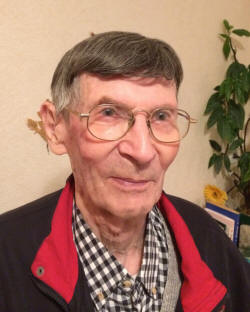

Queer Places:
Chateaubriant Cemetery,
Chateaubriant, Departement de la Loire-Atlantique, Pays de la Loire, France
 Ėmile
Letertre (August 22, 1924 - July 15, 2015), born in Châteaubriant on August 22, 1924, was a Catholic priest, social justice advocate, and gay activist. The son of resistance fighter Marcel Letertre, he was ordained a priest in 1950, later becoming vicar at Frossay, Saint-Gidas-des-Bois and Saint-Étienne-de-Montluc. He was Vicar in Frossay (1951-1952), then in Saint-Gildas-des-Bois (1952-1955), he was then chaplain at Loquidy (1955-1960) then at the Lycée de la Baule (1960-1964) before being vicar at Saint-Étienne-de-Montluc (1964-1967).
At the disposal of the Vicariate General for the Armed Forces (1967-1971), Father Letertre was then in charge of the Saint-Augustin center (1971-1981) and then in charge of the Beaulieu district (1982-1988), in Nantes. After having been diocesan delegate to the Pastoral Care of the Realities of Tourism and Leisure (1988-1994), he was in charge of the Mission of the Pastoral Care of Tourism (1994-2002).
During the 1960s, he worked in several middle schools as a chaplain, before becoming a curate at Saint-Étienne-de-Montluc. In 1972, after a period of profound personal reflection, he founded the Catholic LGBT association, David and Jonathan. As one friend recalls, Letertre made no secret of his sexual orientation but always wore it ‘discreetly, with reserve and great intelligence’.
Ėmile
Letertre (August 22, 1924 - July 15, 2015), born in Châteaubriant on August 22, 1924, was a Catholic priest, social justice advocate, and gay activist. The son of resistance fighter Marcel Letertre, he was ordained a priest in 1950, later becoming vicar at Frossay, Saint-Gidas-des-Bois and Saint-Étienne-de-Montluc. He was Vicar in Frossay (1951-1952), then in Saint-Gildas-des-Bois (1952-1955), he was then chaplain at Loquidy (1955-1960) then at the Lycée de la Baule (1960-1964) before being vicar at Saint-Étienne-de-Montluc (1964-1967).
At the disposal of the Vicariate General for the Armed Forces (1967-1971), Father Letertre was then in charge of the Saint-Augustin center (1971-1981) and then in charge of the Beaulieu district (1982-1988), in Nantes. After having been diocesan delegate to the Pastoral Care of the Realities of Tourism and Leisure (1988-1994), he was in charge of the Mission of the Pastoral Care of Tourism (1994-2002).
During the 1960s, he worked in several middle schools as a chaplain, before becoming a curate at Saint-Étienne-de-Montluc. In 1972, after a period of profound personal reflection, he founded the Catholic LGBT association, David and Jonathan. As one friend recalls, Letertre made no secret of his sexual orientation but always wore it ‘discreetly, with reserve and great intelligence’.
In 1982, while working as a vicar in the Beaulieu district of Nantes, Letertre invited friends from all over Europe to Paris, soliciting their support for a new ecumenical association of LGBT Christians. The following year, the European Forum of Gay Christian Groups held its first meeting in Strasbourg, where seven groups were present. The European Forum gradually expanded in the 1980s and 1990s, changing its name to include lesbian, bisexual, and transgender groups. It is above all an ecumenical network that includes groups from over twenty countries and ten traditions. ‘The little mustard seed has grown into a very tall tree’, Letertre would often reflect, quoting Matthew 13.
Over the years, Letertre also developed a strong interest in history, collecting, and archiving. The deportation of his own Father at the hands of the Nazis motivated him to research and chronicle the persecution of gay men under the Third Reich. He regularly contributed to the local newspaper La Mée and published in 1980 the edited notes of Paul Coyaud, the parish priest of Piriac in the years 1940-1942. From the late 1970s, he worked tirelessly for the recognition of the deportation of gay men by the Nazis. "Each year, thanks to him, we lay a wreath of tribute," remarks Pierre-Yves Le Bru, former president of the Nantes LGBT Centre.
Letertre retired in 2003 but continued to work on historical projects, assisting the group 4ACG, which seeks to memorialize the various atrocities committed during the Algerian War. He passed away in 2015, at the age of ninety. His burial took place in the cemetery of Châteaubriant. Pierre-Yves Lebrun paid tribute to him by describing him as "a priest open to the world, sparkling and full of generosity ... Always engaged in the struggles for equality and Justice’.
An edited collection of Marcel Letertre’s papers, titled Notes on Deportation, was published in 2005.
My published books: